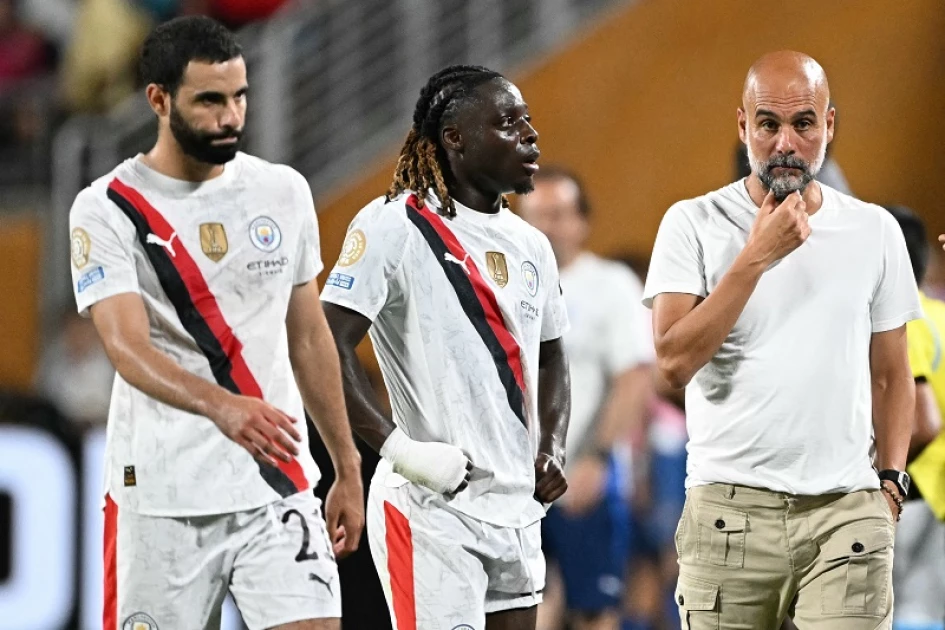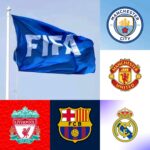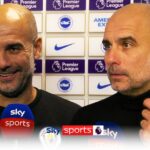Man City players will have a month off before the next training session

Manchester City’s participation in the 2025 Club World Cup was meant to be a triumphant culmination of their recent success and a platform to showcase their global dominance. Instead, it became a cautionary tale of expectations versus reality, ending in a shocking defeat that left more questions than answers. The journey from Manchester to Florida and back again has provided Pep Guardiola and his squad with valuable lessons, financial rewards, and concerning revelations about the current state of the club.
The Club World Cup, redesigned and expanded by FIFA to include 32 teams from around the world, represented a significant opportunity for Manchester City to assert their position as one of football’s elite clubs on the global stage. With their impressive domestic and European pedigree, City entered the tournament as one of the favorites, carrying the hopes of their supporters and the weight of expectation that comes with being managed by one of the world’s most successful coaches.
However, football has a way of humbling even the most successful teams, and City’s journey in the United States would prove to be a perfect example of this universal truth. The tournament that promised so much delivered a stunning upset that sent shockwaves through the football world and forced a period of deep reflection for everyone associated with the club.
The Journey to Florida: High Hopes and Strategic Planning
Manchester City’s preparation for the Club World Cup was meticulous and thorough, reflecting Guardiola’s attention to detail and the club’s commitment to excellence in every competition they enter. The decision to base themselves in Florida was strategic, taking advantage of the state’s excellent training facilities and favorable climate to prepare for what they hoped would be an extended stay in the tournament.
The squad that traveled to the United States was a blend of experience and youth, seasoned campaigners and new signings, all united by a common goal of adding another trophy to the club’s increasingly impressive collection. The sunny climes of their Florida base appeared to provide exactly the environment needed to refresh and rejuvenate a side that had endured a disappointing season by their own lofty standards.
Guardiola’s approach to the tournament was characteristic of his philosophy throughout his managerial career. He treated the Club World Cup with the same seriousness and preparation that he would bring to any major competition, understanding that in football, no opponent can be taken lightly and no tournament can be won without dedication and focus.
The early signs were encouraging. Training sessions were conducted with the intensity and precision that had become synonymous with Guardiola’s Manchester City, and the squad appeared to be in good spirits, with the manager himself noting that “the vibe was really good” and that they were “in a good place” as a team.
Group Stage Success: New Signings Shine
The group stage of the Club World Cup provided Manchester City with the perfect opportunity to integrate their new signings and build momentum for the knockout rounds. The tournament format allowed Guardiola to experiment with different formations and player combinations while still maintaining the competitive edge necessary to progress.
The new signings all played significant parts in the tournament, with each making their mark in different ways. Dutch midfielder Tijjani Reijnders, who had been acquired from AC Milan, immediately stood out for the energy and enthusiasm he brought to the midfield. His presence was exactly what City needed after a season where their midfield had often looked tired and lacking in dynamism.
Reijnders’ impact was not just felt in terms of his individual performances, but also in how his energy seemed to lift the entire team. His pressing, his forward runs, and his technical ability all contributed to a midfield that looked more balanced and threatening than it had for much of the previous season. The Dutchman’s 107 games over the past two seasons had clearly not diminished his appetite for the game, and his integration into Guardiola’s system appeared seamless.
French international Rayan Cherki also made his mark during the group stages, getting off the mark with a goal in the comprehensive 6-0 victory over Al Ain. The £30.5 million signing from Lyon showed flashes of the creativity and flair that had made him such an attractive proposition for City, and his ability to link play between midfield and attack added a new dimension to their offensive capabilities.
City’s group stage performance was exemplary, with the team winning all three of their matches and earning the most prize money among all participating teams during this phase of the competition. The 5-2 victory over Juventus was particularly impressive, showcasing the team’s ability to compete against elite European opposition and suggesting that they were well-prepared for the challenges that lay ahead.
Tactical Innovations and Experiments
The Club World Cup provided Guardiola with an opportunity to experiment with different tactical approaches and player positions, something that would prove to be both beneficial and problematic as the tournament progressed. The manager’s willingness to adapt and evolve his tactics has always been one of his greatest strengths, and the tournament format allowed him to explore new ideas without the immediate pressure of domestic league competition.
One of the most notable experiments was the use of Matheus Nunes at right-back, a decision that highlighted both Guardiola’s tactical flexibility and the squad’s personnel limitations. While Nunes is naturally a midfielder, his pace and technical ability made him a viable option for the full-back position, at least in theory. During the group stages, this tactical adjustment appeared to work reasonably well, with City managing to paper over any defensive deficiencies through their superior quality and attacking prowess.
However, the limitations of this approach would become glaringly obvious when City faced stronger opposition in the knockout rounds. The concept of playing a square peg in a round hole, while sometimes successful in Guardiola’s hands, proved to be a significant weakness when exposed to the intensity and quality of knockout football.
The manager also experimented with different attacking combinations, giving players like Cherki and other new signings the opportunity to develop chemistry with established stars like Phil Foden and Erling Haaland. These experiments were generally successful during the group stages, with the team displaying a fluidity and creativity in attack that had been missing for periods during the previous season.
The Al-Hilal Shock: When David Meets Goliath
The Round of 16 clash with Saudi Pro League side Al-Hilal was expected to be a routine victory for Manchester City, another step on their journey toward what many expected would be Club World Cup glory. The gulf in quality between the Premier League champions and a team from the Saudi Pro League was supposed to be vast, and few observers gave Al-Hilal any realistic chance of causing an upset.
However, football’s capacity for surprise is one of its most enduring qualities, and Al-Hilal’s performance against City will go down as one of the great upsets in Club World Cup history. The Saudi side approached the match with a clear game plan, excellent organization, and the kind of fearless mentality that can sometimes overcome superior individual talent.
For Al-Hilal, this was their chance to “climb Everest,” as one observer put it, and they seized the opportunity with both hands. Their approach was built on solid defensive foundations, quick transitions, and the kind of pace and directness that would expose City’s defensive vulnerabilities. The Saudi side’s forwards, in particular, caused problems for City’s central defenders with their speed and movement, highlighting concerns that had been developing throughout the season.
The match itself was a dramatic affair that went to extra time, with Phil Foden scoring for City to seemingly rescue them from an embarrassing defeat. Cherki’s glorious assist for Foden’s goal was a moment of individual brilliance that showcased the French international’s ability to create something from nothing, but it would not be enough to prevent what was ultimately a shocking defeat.
The loss sent shockwaves through the football world and immediately raised questions about Manchester City’s current state. How could a team with such quality and experience lose to opponents who, on paper, should not have been able to compete with them? The answer lay in a combination of factors that had been building throughout the season and were cruelly exposed by Al-Hilal’s disciplined and energetic performance.
Defensive Concerns Exposed
The defeat to Al-Hilal brutally exposed the defensive concerns that had been developing within Manchester City’s squad throughout the season. The lack of pace in the heart of the defense became glaringly obvious when the team was forced to chase back against Al-Hilal’s speedy forwards, with the two central defenders looking particularly sluggish in their attempts to recover.
This defensive vulnerability was not a new problem for City, but it had been masked to some extent by their superior possession and control in most domestic matches. Against Al-Hilal, however, they were forced to defend more reactively, and the limitations of their central defensive pairing became painfully apparent.
The right-back position also proved to be a significant problem, with the makeshift solution of playing Matheus Nunes in that role being exposed against decent opposition. While Nunes had performed adequately during the group stages, the step up in quality and intensity in the knockout rounds revealed the limitations of this tactical arrangement. The square peg in a round hole approach, which had worked against weaker opposition, proved to be a critical weakness when facing a well-organized and determined opponent.
Rayan Ait-Nouri, the new signing from Wolves, also showed the defensive limitations that had been a concern even before his arrival at the club. While his attacking ability was undoubted, and he had provided an assist in the victory over Juventus, there were question marks over his defensive capabilities. Against Al-Hilal, he was caught out on several occasions, highlighting the need for City to find a better balance between attack and defense in their full-back positions.
Squad Depth and Player Management Issues
The Club World Cup also highlighted several issues related to squad depth and player management that Manchester City will need to address in the coming transfer windows. The fact that England international John Stones was the only outfield player not to see any minutes during the tournament raised questions about his future at the club and Guardiola’s plans for the squad moving forward.
Stones’ absence from the team was particularly notable given the defensive concerns that were exposed during the tournament. His experience and quality would have been valuable in addressing some of the pace and organization issues that became apparent in the knockout rounds, yet he remained unused throughout the trip to Florida.
The situation with Rodri also provided cause for concern, with the midfielder appearing to suffer a setback after missing most of the season through injury. Guardiola’s comment that Rodri “complained about his situation” after being substituted during extra time against Al-Hilal suggested that the Spanish midfielder may not be fully recovered from his injury problems.
This is particularly worrying for City given Rodri’s importance to their system and the fact that they have struggled to find an adequate replacement for him when he has been unavailable. The Club World Cup was supposed to be an opportunity for Rodri to build match fitness and confidence, but instead, it may have revealed that his injury problems are more serious than initially thought.
Financial Implications and Value Assessment
Despite the disappointing on-field results, the Club World Cup proved to be a financially lucrative venture for Manchester City. The club earned approximately £37.8 million from their participation in the tournament, including almost £1.5 million per win and a substantial participation fee believed to be £27.9 million, which FIFA based on “sporting and commercial criteria.”
This financial return was significant enough to effectively pay for one of their major new signings, with the club having spent £31 million on Ait-Nouri and £30.5 million on Cherki. The fact that their tournament earnings nearly covered the cost of both transfers demonstrates the financial importance of these expanded international competitions for top-level clubs.
However, the financial benefits came with an opportunity cost. Had City progressed to the quarter-finals, they would have earned an additional £9.5 million in prize money, with that total potentially rising to an extra £53.8 million had they gone on to lift the trophy. The early exit therefore cost the club significant prize money that would have been valuable for future transfer activities and financial planning.
The comparison with Chelsea, who remained in the competition and surpassed £40 million in prize money following their victory against Benfica in the last 16, highlighted what City had missed out on. The financial implications of their early exit extended beyond the immediate prize money, as success in such high-profile tournaments also brings increased commercial opportunities and global exposure.
Physical and Mental Toll on Players
The Club World Cup represented the culmination of an incredibly demanding season for Manchester City’s players, with the squad having played 61 games since August, equaling their most in a season since Guardiola became manager in 2016. This physical and mental toll was evident in some of the performances during the tournament and may have contributed to the shock defeat against Al-Hilal.
The statistics surrounding player workload were particularly concerning, with only three top-flight clubs in Europe having played more often over the past 11 months. This heavy schedule was compounded by the fact that City, with their smaller squad compared to some rivals, had been unable to rotate as extensively as they might have liked throughout the season.
Four of City’s outfield players currently with Premier League clubs had played more than 100 games over the past two seasons: Tijjani Reijnders (107), Ilkay Gundogan (105), Phil Foden (102), and Bernardo Silva (101). These players, with the exception of Gundogan, had also been regular starters for their countries at Euro 2024 and continued to play international football, adding to their physical burden.
The workload statistics were even more striking when considering individual players. Reijnders had racked up 4,861 minutes for AC Milan in the previous season, with only two outfield players in Europe’s major leagues able to top that figure. Meanwhile, Josko Gvardiol, Bernardo Silva, and Erling Haaland all ranked in the top 13 among Premier League players for minutes played.
Lessons Learned and Future Implications
The Club World Cup experience provided Manchester City with valuable lessons that will inform their planning for the upcoming season and beyond. The tournament exposed several areas where the squad needs strengthening and highlighted tactical approaches that require refinement or abandonment.
The most obvious lesson was the need to address the defensive issues that had been developing throughout the season. The lack of pace in central defense and the problems at right-back were exposed brutally by Al-Hilal’s approach, and these issues will need to be resolved before the new season begins. Sources had not ruled out the signing of a new right-back before the tournament, and the experiences in Florida may have accelerated those plans.
Guardiola’s acknowledgment that he needs to trim his squad heading into the new season was also reinforced by the tournament experiences. The situation with John Stones and other fringe players will need to be resolved, with the manager needing to find the right balance between squad depth and maintaining harmony within the group.
The positive aspects of the tournament should not be overlooked, however. The integration of new signings like Reijnders and Cherki showed promising signs, and their contributions suggest that City’s recruitment strategy is sound. The energy and enthusiasm that these players brought to the squad will be valuable assets in the coming season.
Comparison with Domestic Rivals
The Club World Cup also provided an interesting comparison point with Manchester City’s domestic rivals, particularly Chelsea, who remained in the competition after City’s elimination. Chelsea’s continued participation highlighted the different approaches the two clubs had taken to squad management and rotation throughout the season.
Chelsea had the luxury of fielding vastly different line-ups in the Conference League compared to their domestic commitments, allowing them to manage player workloads more effectively. This approach appeared to pay dividends in the Club World Cup, where their fresher players were able to maintain the energy and intensity required for success in knockout football.
The contrast between the two clubs’ experiences in the tournament raised questions about Manchester City’s squad management and whether their smaller squad size had ultimately proved to be a disadvantage. While City had traditionally prided themselves on working with a more compact group of players, the demands of modern football may require a different approach.
The Road Ahead: Recovery and Renewal
As Manchester City’s squad prepared to fly back to Manchester, the focus shifted immediately to the future and the lessons that could be learned from their Club World Cup experience. Guardiola’s comment that “now it is time to rest – rest our minds for the new season” acknowledged the mental and physical toll that the extended campaign had taken on his players.
The period of rest and recovery that followed the tournament would be crucial for the squad’s preparation for the new season. The defeat to Al-Hilal, while disappointing, provided valuable insights into areas that needed improvement and could ultimately prove beneficial if the lessons were learned and acted upon.
The transfer market would likely be active for City in the coming weeks, with the defensive issues exposed in Florida providing clear priorities for strengthening. The right-back position, in particular, appeared to require immediate attention, while the pace and organization of the central defense would also need to be addressed.
Conclusion: Valuable Lessons from Unexpected Defeat
Manchester City’s Club World Cup journey was ultimately a story of unfulfilled expectations and valuable lessons learned. While the shock defeat to Al-Hilal was undoubtedly disappointing for a club of City’s stature and ambitions, the experience provided important insights that could prove beneficial in the long term.
The tournament exposed defensive vulnerabilities that needed to be addressed, highlighted the physical and mental toll of an extended season, and demonstrated the importance of squad depth and rotation in modern football. However, it also showcased the potential of new signings, provided valuable match experience for the squad, and generated significant financial returns.
The financial benefits of participation, while not reaching their full potential due to the early exit, were still substantial enough to justify the trip to Florida. The approximately £37.8 million earned from the tournament represented a significant return on investment and helped fund the club’s transfer activities.
Perhaps most importantly, the Club World Cup experience served as a reminder that in football, no opponent can be taken lightly and no result can be guaranteed, regardless of the difference in quality on paper. Al-Hilal’s victory over Manchester City will be remembered as one of the great upsets in Club World Cup history, but for City, it represented a valuable lesson in humility and the need for constant improvement.
As Guardiola and his squad returned to Manchester, they did so with a clearer understanding of their strengths and weaknesses, and with the knowledge that success in football requires not just talent and resources, but also the right approach, preparation, and respect for every opponent. The Club World Cup may not have delivered the trophy they wanted, but it provided something equally valuable: the lessons needed to ensure future success.
The journey from promise to disappointment and back to renewal is a familiar one in football, and for Manchester City, the Club World Cup experience represented another chapter in their ongoing evolution as a club. The true measure of their response to this setback will be seen in how they apply the lessons learned and whether they can use this disappointment as motivation for future success.















